Dental implants can help you smile more confidently. A dental implant is permanent and is an effective, attractive, secure way to fill gaps in your smile-all while preserving your existing teeth.
Dental implants are an effective way to replace missing teeth. When teeth are lost because of disease or an accident, dental implants may be a good option. You may want to choose dental implants if you:
- hide your smile because you have missing teeth
- wear dentures that are uncomfortable
- are dissatisfied with your removable partial dentures
- want to keep your other teeth intact
Many people choose implants to replace a single tooth or several teeth, or to support a full set of dentures. Implants are posts surgically placed into the upper or lower jawbone. They replace the root of one or more missing teeth.
Dental implants are made of titanium (a strong, lightweight metal) and other materials that are well accepted by the body.
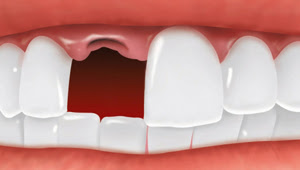
Missing Tooth
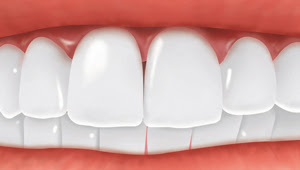
Replaced Tooth with Dental Implants
Benefits of Dental Implants
- Implants offer firm support to man-made teeth. Dentures, bridges or single teeth attached to the implants won’t slip or shift in your mouth-a very important benefit when eating and speaking.
- This secure fit also helps man-made teeth feel more natural than typical bridges or dentures.
- Some people may find implant-supported dentures more comfortable than dentures that do not use implants.
- Where teeth are missing, dental implants also help keep the jawbone from shrinking.
- Implants are a good value, because they can last a lifetime with good care.
Single Tooth Implants
The single tooth implant replaces the missing tooth’s roots. A single tooth implant is a stand-alone unit and does not involve treating the teeth next to it.
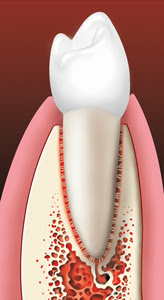
Natural Tooth
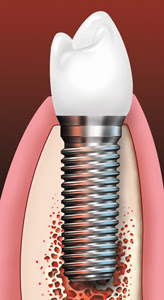
Dental Implants Crown
If you are missing one or more teeth, there are many reasons why you should replace them:
- You may not like how the gap looks when you smile.
- Missing teeth may affect how you speak.
- A missing molar tooth can make it harder to chew.
- When a tooth is lost and not replaced, the teeth around it can shift.
- Bone loss can occur around the missing tooth. This may cause the remaining teeth to become loose over time.
- Loss of teeth and bone can make your face sag. You may look older.
Implant-Supported Bridges and Dentures
Dental implants can be used to support a bridge when several teeth are missing. The implant-supported bridge replaces the lost natural teeth and some of the tooth roots. Unlike traditional bridges, an implant-supported bridge does not need support from the teeth next to it.
If you are missing all of your teeth, an implant-supported denture can replace the missing teeth and some of the tooth roots. Because the dental implants integrate (or “fuse”) with the jawbone, an implant-supported denture tends to be comfortable and stable, allowing you to bite and chew naturally.
Implant-Supported Denture
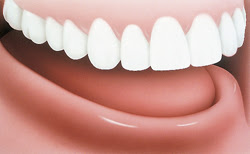
Before Implant-Supported Denture
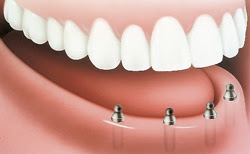
During Implant-Supported Denture Process
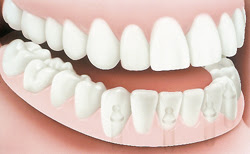
After Implant-Supported Denture
Implant-Supported Bridge
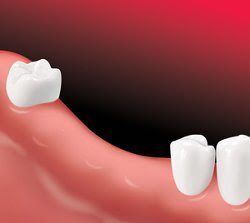
Before Implant-Supported Bridge
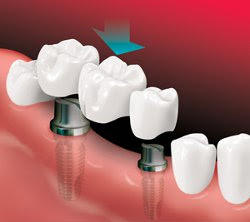
During Implant-Supported Bridge Process
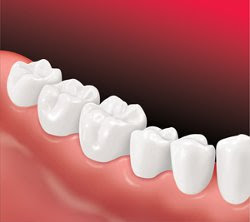
After Implant-Supported Bridge
What Is Involved in Implant Placement?
Many kinds of implants are available. Treatment can take only one day, or it can take several months, or somewhere in between. Your dentist and you can discuss which type of implant is best for you.
Implant treatment usually involves three basic steps:
Placement of the Implant
Your dentist will carefully locate where the implant should be placed, using x-rays or other pictures. Then the dentist surgically places the implant into the jawbone. You may have some swelling and/or tenderness after surgery. Your dentist may prescribe pain medicine to ease the discomfort. During the healing process, your dentist may tell you to eat soft foods.
Healing Process
What makes an implant so strong is that the jawbone grows around it and holds it in place. This process, called osseointegration (OSS-e-o-in-te-GRAY-shun), takes time. It may be several months before the implant is completely integrated into the bone. Then the patient can get the permanent replacement tooth or teeth. In many cases, the implant and temporary replacement teeth can be placed in one visit.
Placement of the Prosthesis (Replacement Tooth or Teeth)
For a single tooth implant, the dentist custom-makes a new tooth for you, called a dental crown. It is designed to look just like your other teeth. Implant-supported bridges and dentures are also custom-made to look like natural teeth and to fit your mouth. The replacement teeth are attached to the implant posts.
Replacement teeth usually take some time to make. In the meantime, your dentist may give you a temporary crown, bridge or denture. This will help you eat and speak normally until the permanent replacement teeth are ready.
Who Is a Good Candidate for Dental Implants?
If you are in good general health and your jaw can support an implant, this treatment may be a good option for you. Your health is more important than your age.
However, implants are not an option for everyone. Patients should be in good health or cleared by their physicians before scheduling any implant surgery. They should have enough jawbone to support the implant or be able to have surgery to build up the jawbone. Bone can be built up with a bone graft or with sinus lift surgery.
Chronic illnesses, such as diabetes and leukemia, may slow healing after surgery. Implant treatment may not be a good option for patients with these illnesses. Tobacco use also can slow the healing process.
If your dentist does recommend implant treatment, careful oral hygiene is essential for the success of the implant. You must spend time caring for the implant and making sure the area around it is very clean. If not, you might increase your risk for gum disease, which can weaken the bone and tissues needed to support the implant.
Other Things to Think About
You should discuss implant treatment carefully with your dentist. Dental implant treatment can take longer and cost more than other replacement options. But dental implants are often a good value because they can last a lifetime.
Regular dental visits are key to the long-term success of your implant. Your dentist will set up a program to help you keep your implant and natural teeth healthy.
Your dentist also will suggest a home-care routine that meets your needs. It will include brushing twice a day and flossing once a day. You also may be advised to use a special toothbrush or mouthrinse to help prevent cavities and gum disease.
Talk with your dentist about dental implants. He or she can help you decide if implant treatment is right for you. With careful treatment planning and good oral care, dental implants can provide a healthy smile for a lifetime.




